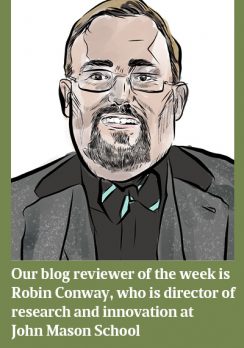Whole-staff training, the early years curriculum, implementing research, wellbeing and letting teachers teach are Robin Conway’s top picks of the education topics this week
Staff Training Days – what’s your experience?
@jillberry102
Jill Berry’s blogs are always thoughtful, reflective and draw on a wealth of experience in different educational roles. This piece is no different. Looking back over four decades at the change since the introduction of “Baker days” in 1988, she reflects on the value of staff training days in light of research that suggests their impact is highly questionable. Her thoughts on how to maximise the impact and inclusivity of whole-staff training are the most powerful part of a great read. Berry makes a good case for the value of “the whole staff coming together as a community to learn”. If you’re leading CPD, this blog is an indispensable starting point for how to do it well.
Implementing A Knowledge Rich Curriculum in the Early Years
@DebbieMann
Having recently become a primary school governor, I’ve started to expand my reading into early years and key stages 1 and 2. This piece by Debbie Mann is an excellent analysis of the importance of early-years teaching and the significance of teachers to their wider communities. Mann outlines some approaches she has implemented in her pre-school to engage with research and ideas from Hirsch, Engelmann and others. I particularly liked “snack facts” and the early introduction of non-fiction texts. For those looking for ideas for their early-years curriculum, this is a great place to start, and I hope that there will be more posts from Mann in the future.
Shifting Lines: Does Everything Work Somewhere?
@adamboxer1
When it comes to research, sometimes we can be a little too ready to adopt ideas because they are “research-based”. At other times we can be resistant to changing our practice without being clear on the reasons why. While important, empowering teachers to engage in critical analysis of research does not necessarily ensure we achieve the right balance. What should we be thinking about? How do we evaluate research and new pedagogical ideas to decide which ones are worth adopting? I have never seen these questions answered more clearly and succinctly than in this blog by Adam Boxer. After a highly relevant analogy from the field of chemistry – so well-explained that even I could follow it – Boxer explains exactly why the key question to ask is “not ‘what is the impact of this?’ but ‘how likely am I to screw it up?’…If your intervention is hard to implement, it’s not a good intervention.”
I’m Still Standing – Just a Little Further Back
@MrHtheteacher
In the last few years, teacher well-being has increasingly taken on the prominence it always should have had in educational discourse. Some of Mr H’s experiences illustrate exactly why it is so important, and highlight that there is much work still to be done. He honestly recounts some of the challenges and unhelpful feedback he experienced and the impact they had on his motivation and health, but the piece remains a positive one. By choosing a school based on the headteacher’s ethos, even though it was a “step back” career-wise, he has “found a place of kindness, compassion and happiness”. It’s hard to read this and not come to the conclusion that the education system needs more places like that to keep hold of more teachers like Mr H.
@Ni_Principal
From Northern Ireland comes this piece by a principal who finds his own pedagogical instincts at odds with prevailing directives. Rather than focus on generic “thinking skills and personal capabilities” this principal wants to empower his teachers to do what they do best: teach and model the subjects about which they are passionate. The piece is not advocating a return to “chalk and talk”; it is a nuanced approach to learning, which includes a range of teacher-led activities. Drawing on Sam Strickland’s Education Exposed and the reality of running a school, this post is a powerful affirmation that “the teacher is the expert, not the guide on the side”.













Your thoughts